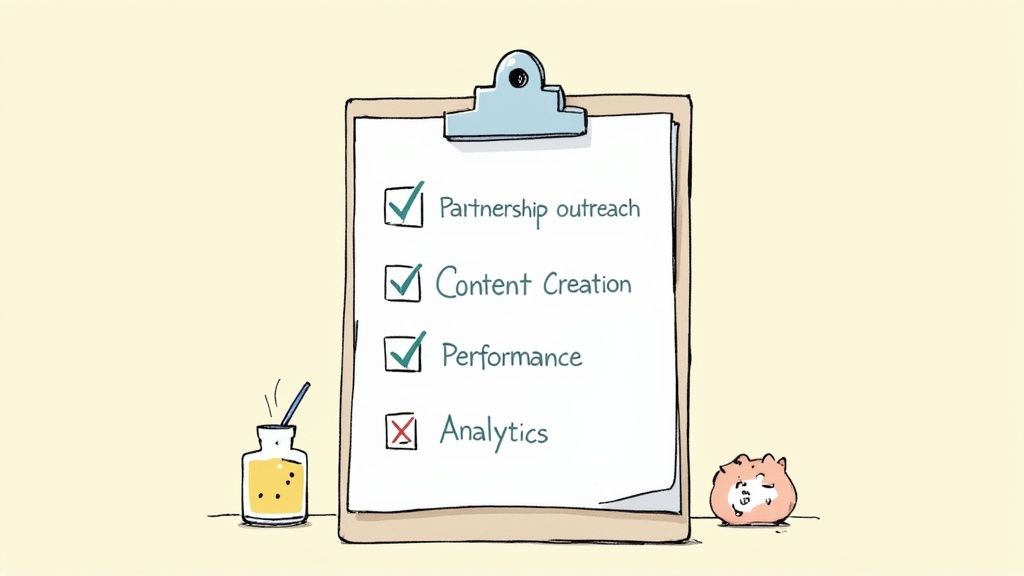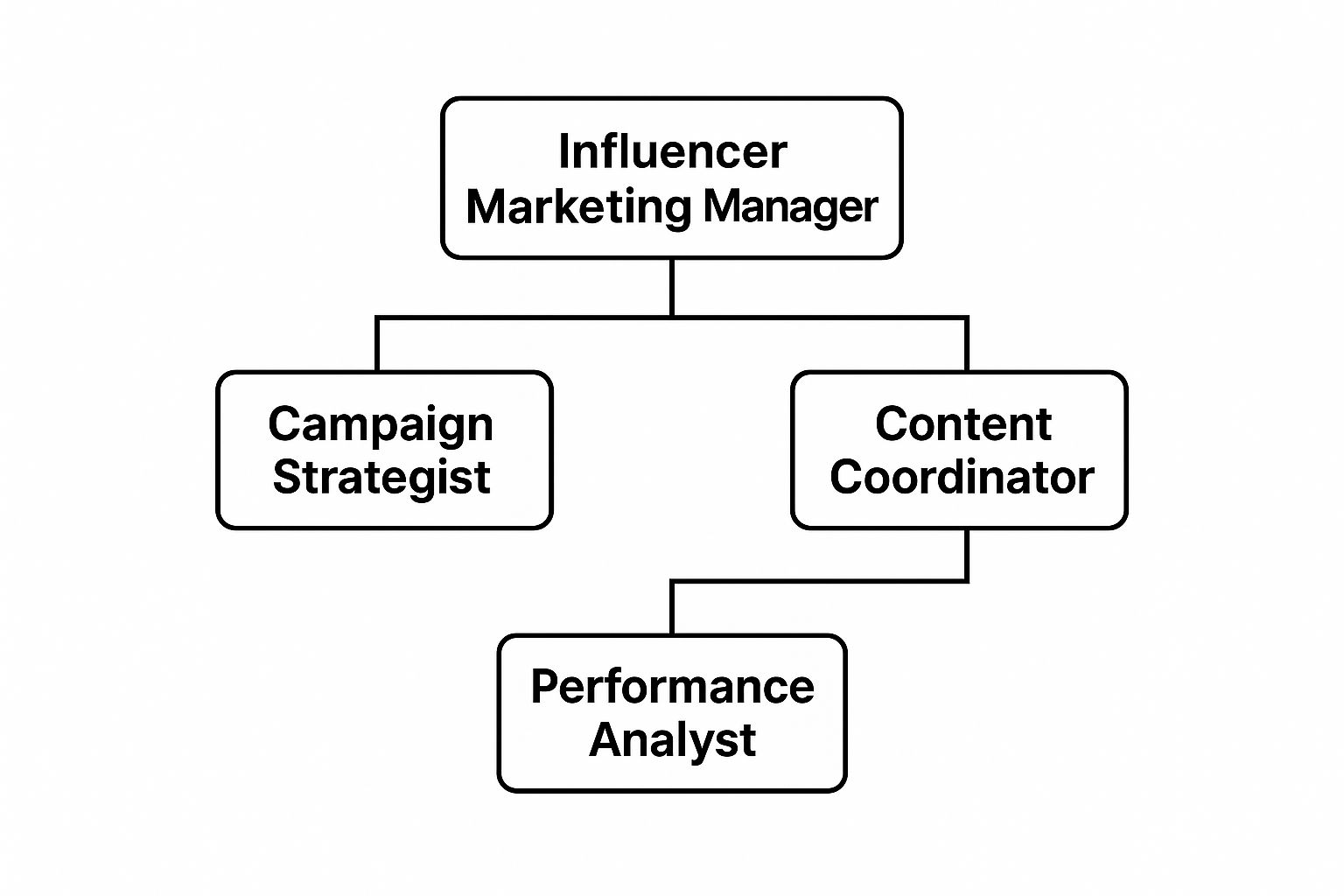
Influencer Marketing Job Description That Attracts Talent
Published
Think of an influencer marketing job description as more than just a list of tasks. It's your company's first handshake with the talent you want to attract. Essentially, it’s a blueprint that details the responsibilities, qualifications, and skills needed for the professional who will manage your brand's crucial relationships with online creators. A well-crafted one attracts people who can build genuine connections, run stellar campaigns, and deliver real, measurable results for your business.
What an Influencer Marketing Role Really Looks Like Today

If you think this job is still about just sending out free products in exchange for a quick Instagram story, think again. Those days are long gone. The modern influencer marketing role is a sophisticated mix of public relations, data science, and creative direction.
Imagine a professional who is part talent scout, part data analyst, and part creative partner, all rolled into one. They aren't just chasing follower counts; they are architects of authentic communities built around a brand.
This isn't a niche skill anymore—it's in high demand. With the influencer marketing industry projected to hit a staggering $32.55 billion globally by 2025, companies are scrambling to find professionals who can expertly plan, execute, and analyze campaigns. This massive growth is why nearly 47% of brands have shifted their focus to building long-term partnerships instead of one-off posts, making relationship management an absolutely critical skill.
The Four Pillars of a Modern Influencer Marketing Role
This position has graduated from a side task to a full-time, strategic function on any forward-thinking marketing team. The role is complex, demanding a rare blend of sharp analytical skills and genuine people skills. Before you can write a job description that attracts the right person, you need to understand what the job actually entails. For a deeper dive into the different specializations, you can check out our detailed breakdown of various influencer marketing roles.
To really get to the heart of it, the job rests on four foundational pillars. These pillars work together to connect the brand's goals with the creator's unique voice.
A great influencer marketer acts as the bridge between a company's strategic goals and a creator's authentic voice. They ensure the partnership feels genuine to the audience while delivering tangible ROI for the business.
Here's a quick look at the core pillars that define what a modern influencer marketing professional does every day. This will give you a solid foundation for building out your own influencer marketing job description.
Core Pillars of an Influencer Marketing Role
The table below summarizes the fundamental responsibilities that define a modern influencer marketing professional's job.
| Pillar | Core Function | Key Outcome |
|---|---|---|
| Strategy & Planning | Defining campaign goals, identifying the target audience, and selecting the right platforms. | A clear roadmap that connects every influencer activity directly to business objectives. |
| Relationship Management | Finding, vetting, and nurturing authentic, long-term relationships with aligned creators. | A loyal network of brand advocates who produce compelling and persuasive content. |
| Campaign Execution | Negotiating contracts, creating clear briefs, and overseeing the entire content creation process. | Smooth, on-brand campaign launches that meet all deadlines and legal standards. |
| Performance Analysis | Tracking key metrics, calculating ROI, and delivering insightful performance reports. | Actionable data that proves a campaign's value and helps make future strategies even better. |
Understanding these four areas is the first step toward hiring someone who can truly make an impact.
Core Responsibilities That Drive Results

When you're writing an influencer marketing job description, the responsibilities section is your chance to show candidates what the job is really about. This is where you move past vague duties like "manage campaigns" and detail the day-to-day actions that will actually move the needle for your business.
Think of a great influencer marketer as part strategist, part relationship-builder. They aren't just shipping out free products; they're building a delicate ecosystem of people, content, and data. This role is a unique mix of creative intuition, sharp negotiation, and analytical rigor, all working together to make sure every collaboration feels genuine and hits its mark.
The responsibilities you outline should paint a vivid picture of this dynamic role. It’s a full-time commitment that requires a surprisingly broad skillset to do well.
Strategic Planning and Creator Discovery
The work doesn't start with outreach—it starts with a plan. An influencer marketer’s first job is to define what a "win" looks like for any given campaign. That means setting concrete goals, deciding which key performance indicators (KPIs) matter most, and getting crystal clear on the target audience.
Only then does the hunt for the right partners begin. It’s less about finding the creators with the most followers and more about finding the ones with the right voice. This part of the job involves:
- Identifying and Vetting: Digging into platforms like TikTok, Instagram, and YouTube to find creators whose audience and personal brand are a natural fit for yours.
- Audience Analysis: Going deeper than follower numbers. You need someone who can analyze engagement rates, audience demographics, and even the sentiment in the comments to confirm it's a true match.
- Relationship Building: Kicking off conversations with genuine, personalized outreach to build rapport long before a contract is even on the table.
Campaign Management and Execution
With the right partners on board, the role shifts from planning to doing. This is the operational heart of the job, where strategy becomes reality. A talented marketer manages the entire lifecycle of a campaign, from the first negotiation to the final post, keeping things running smoothly for both the creator and the brand.
A huge part of this role is being the ultimate liaison. They have to advocate for the brand's goals while honoring the creator's voice, finding that perfect balance where marketing objectives and authentic content can coexist.
Key tasks here include negotiating contracts that spell out deliverables, content usage rights, and payment terms in plain language. They also craft detailed campaign briefs that give creators the guidance they need without killing their creative spark. For a deeper dive into how this plays out in a more senior role, our guide on the influencer marketing manager job description offers some great examples.
Performance Tracking and Reporting
At the end of the day, you can't improve what you don't measure. The ability to effectively measure content marketing ROI is what truly separates a good influencer marketer from a great one.
This means consistently tracking campaign performance against the KPIs that were set at the very beginning. The metrics they’ll live and breathe often include:
- Reach and Impressions
- Engagement Rate (likes, comments, shares)
- Website Clicks and Conversions
- Return on Ad Spend (ROAS)
A top candidate will be comfortable using analytics tools to pull this data, make sense of it, and communicate the results in clear, straightforward reports. These insights aren't just for showing off their success; they're the key to making every future campaign even better.
Key Qualifications and Professional Experience

When you're trying to fill an influencer marketing role, it's easy to get hung up on formal education. A degree in marketing or communications looks great on paper, but in this field, it's not the whole story. What you really need to look for when writing your influencer marketing job description is a proven track record. Real-world results will always outweigh a diploma.
Think about it like hiring a chef. You wouldn't hire someone just because they graduated from a prestigious culinary school; you’d want to taste their cooking. The same logic applies here. You need to see a portfolio brimming with successful campaigns, whether they were executed on TikTok, Instagram, or YouTube. This tangible proof is what shows a candidate can actually handle the job from start to finish—from the initial creative spark to the final performance report.
Proven Experience Over Formal Education
The best candidates are the ones who can walk you through the campaigns they’ve managed and clearly articulate the results. This hands-on knowledge is what separates a decent hire from a truly great one. It demonstrates they get the nuances of different platforms and know how to pivot their strategy when needed.
Be on the lookout for candidates who can show you:
- A strong portfolio packed with clear examples of past influencer partnerships.
- Specific campaign metrics they directly impacted, like a jump in engagement or a boost in conversions.
- Experience managing budgets and stretching every dollar to get the best possible return.
Focusing on these results-driven qualifications helps you find someone who can hit the ground running, not someone who only knows the theory. Their past successes are your best clue to their future performance.
The bottom line is this: a candidate’s ability to show you a successful campaign they ran for a small brand on a tight budget is far more telling than a 4.0 GPA in a marketing program.
Essential Hands-On Platform and Tool Proficiency
Beyond a solid campaign history, your ideal candidate needs to be fluent in the tools of the trade. Modern influencer programs aren't just about good people skills; they require a deep understanding of the software that makes discovery, management, and reporting possible.
Your job description should get specific and ask for experience with:
- Influencer Marketing Platforms: Think tools like Upfluence, GRIN, or AspireIQ.
- Social Media Analytics Tools: This includes both native insights (like what you'd find on Instagram) and more robust third-party software.
- Project Management Software: Familiarity with Asana, Trello, or Monday.com is crucial for keeping campaigns on track.
This kind of technical skill is non-negotiable. It proves a candidate can work efficiently and use data to back up their decisions—a critical skill as the industry doubles down on measurable ROI. In fact, recent data shows that 80% of brands are either maintaining or increasing their influencer marketing spend. This investment is driving the demand for pros who can deliver on high-return strategies like brand ambassador and affiliate programs. You can find more details on what brands expect in 2025 and beyond over on PR Newswire.
The Essential Skills of a Top Performer
A great influencer marketer is a fascinating mix of creative and strategist, someone who has both social savvy and a sharp analytical mind. When you're crafting your influencer marketing job description, making sure you call out these distinct skill sets is your best bet for attracting candidates who can truly handle the role's demands. One minute, they’re digging into campaign data; the next, they're building a real, genuine connection with a top-tier creator.
This blend of hard and soft skills is what truly separates a good hire from a great one. The best in the business can pivot from negotiating contract specifics to brainstorming brilliant content ideas without missing a beat. They get that relationships are what drive results, but they also know that data is what proves the value of their work. It’s this balanced approach that helps them succeed in the people-focused world of influencer marketing while delivering measurable wins for the business.
The Analytical Mindset: Hard Skills
Hard skills are the technical, teachable abilities that are the bedrock of any effective campaign. Think of them as the concrete competencies that turn a creative vision into a profitable reality. They are the engineering skills you need to build a solid, reliable bridge between your brand and an influencer's community.
Essential hard skills include:
- Data Analysis and ROI Tracking: The ability to dive deep into campaign metrics, understand what the numbers are saying, and calculate the return on investment is absolutely non-negotiable. This is how you know what’s working and what’s not.
- Budget Management: A top performer can forecast costs with precision and manage a budget to get the most bang for your buck without going over.
- Contract Negotiation: Your ideal candidate needs to be comfortable hammering out clear, fair, and legally sound contracts that protect both your brand and the creator.
- Platform Proficiency: In-depth knowledge of social media platforms and influencer marketing tools is crucial for running campaigns smoothly and efficiently.
This visual breaks down how these different skills often fit within a typical team structure, from big-picture strategy all the way down to the nitty-gritty analysis.

The structure makes it clear that from the Manager to the Analyst, you need a variety of roles to support a successful program.
The People-First Approach: Soft Skills
If hard skills are the science behind influencer marketing, then soft skills are the art. These are the interpersonal qualities that allow a marketer to build the strong, authentic relationships that are the absolute lifeblood of this industry.
In a field built on human connection, soft skills aren't just nice-to-haves; they are a core business requirement. A marketer who can't connect with people can't connect a brand with an audience.
Look for these critical soft skills in your candidates:
- Genuine Relationship-Building: The ability to form authentic, lasting partnerships with creators is what this is all about.
- Persuasive Communication: They need to be able to clearly articulate the brand’s vision and inspire creators to bring their A-game.
- Creative Problem-Solving: Campaigns rarely go perfectly to plan. Adaptability and the ability to think on your feet are essential.
Finding someone with a healthy balance of these hard and soft skills is the ultimate goal. For a more detailed look, our guide on essential influencer marketing skills offers an even deeper dive into this topic.
Hard Skills vs. Soft Skills for Influencer Marketers
To help you distinguish between the two, here’s a quick comparison of the essential technical and interpersonal skills you should be looking for.
| Skill Category | Essential Skills | Why It's Important |
|---|---|---|
| Hard Skills | Data Analysis, ROI Calculation, Budget Management, Contract Negotiation, SEO Basics | These are the measurable, data-driven skills that ensure campaigns are profitable and efficient. |
| Soft Skills | Relationship-Building, Communication, Creativity, Problem-Solving, Adaptability | These are the people-centric skills that build trust and foster authentic collaborations. |
Ultimately, a candidate who excels in both categories is the one who will not only run successful campaigns but also build a sustainable and respected influencer program for your brand.
Your Influencеr Markеting Job Dеscription Tеmplatе
Alright, we’ve covered the responsibilities, qualifications, and skills that separate the best influencer marketers from the rest. Now, it's time to bring it all together. This is where the rubber meets the road.
Below is a practical, easy-to-customize template designed to help you write an influencer marketing job description that doesn't just get views—it gets applications from the right people. Don't think of this as a simple fill-in-the-blanks document. It’s more like a toolkit, complete with notes explaining the "why" behind each section so you can perfectly capture your company's unique needs and vibe.
A well-crafted job description acts as your first filter, attracting candidates who genuinely fit your culture and goals. As you build yours out, remember that principles from other perfecting job description guides can be incredibly useful, offering solid strategies that apply to any role you're trying to fill.
Job Summary Template
This is your first impression—your hook. It’s the very first thing a potential hire will read, so it needs to grab their attention and clearly spell out why this role matters. Ditch the stiff corporate jargon and instead, paint a compelling picture of the impact they'll have on your team.
Template:
- Job Title: Influencer Marketing [Manager/Specialist/Coordinator]
- Location: [e.g., Remote, Hybrid, On-site in City, State]
- Reports To: [e.g., Director of Marketing, Head of Social Media]
[Your Company Name] is looking for a creative and data-driven Influencer Marketing [Manager/Specialist] to build and scale our creator partnership program from the ground up. In this role, you’ll own the entire influencer campaign lifecycle—from finding and connecting with amazing creators to launching strategies that boost brand awareness, drive engagement, and generate real revenue. You’re a natural at building relationships, a sharp strategic thinker, and you live and breathe digital storytelling.
Why this works: This summary immediately calls out the core functions (relationship-building, strategy, execution) and the ideal personality traits (creative, data-driven). Crucially, it links the job directly to business goals like awareness and revenue, which speaks to results-oriented candidates.
Core Responsibilities Template
Here’s where you get into the nitty-gritty. This section should give candidates a crystal-clear idea of what their day-to-day will actually look like. Use strong action verbs and be as specific as possible.
Template:
- Dream up and execute innovative influencer marketing strategies and creative campaigns.
- Find, vet, and build genuine, long-term relationships with content creators and brand ambassadors.
- Handle all contract negotiations, including deliverables, usage rights, and compensation.
- Manage campaign budgets to ensure every dollar delivers a strong return on investment (ROI).
- Work closely with the wider marketing team to make sure influencer campaigns and other initiatives are perfectly in sync.
- Track, analyze, and report on key performance indicators (KPIs), turning raw data into actionable insights.
- Keep your finger on the pulse of industry trends, new platform features, and what our competitors are up to.
Why this works: The list neatly separates strategic duties (dreaming up strategies) from operational tasks (negotiating contracts) and analytical responsibilities (tracking KPIs). It gives a full, 360-degree view of what the job truly entails.
Qualifications and Skills Template
In this section, you'll lay out the must-haves. A great tip is to clearly separate the absolute requirements from the "nice-to-haves." This simple step can dramatically widen your talent pool.
Template:
- [X]+ years of proven, hands-on experience in influencer marketing, social media, or a closely related role.
- A strong portfolio you're proud of, showcasing successful influencer campaigns on platforms like Instagram, TikTok, and YouTube.
- Experience using influencer marketing platforms (like GRIN or Upfluence) and social analytics tools.
- Top-notch negotiation, communication, and relationship-building skills.
- A solid grasp of social media KPIs and how to track campaign ROI.
- (Preferred) Experience with brand ambassador or affiliate marketing programs.
- (Preferred) A Bachelor’s degree in Marketing, Communications, or a related field.
Why this works: Kicking off with "proven experience" and a "strong portfolio" signals that you value real-world results over just formal education. Listing degrees and specific program experience as "preferred" is a smart move—it ensures you don’t accidentally screen out a rockstar candidate who took a non-traditional career path.
Common Questions About Influencer Marketing Roles
When you're putting together an influencer marketing job description, you'll quickly notice the same questions pop up from both your hiring team and the candidates themselves. Getting ahead of these common queries helps everyone get on the same page right from the get-go.
Let's tackle a few of the big ones.
What Is a Typical Salary Range?
Alright, let's talk money. This is usually the first thing everyone wants to know, and for good reason. Salaries in this field can swing quite a bit depending on experience level, the city you're in, and the size of the company.
Still, there's a general ballpark you can work from:
- Entry-Level (Coordinator/Specialist): You can expect a range of $50,000 to $70,000 per year. These folks are in the trenches, handling the day-to-day execution, coordinating content, and supporting the team leads.
- Mid-Level (Manager): This is where salaries typically land between $75,000 and $100,000. Managers are the ones running campaigns from start to finish, juggling budgets, and building out the actual strategy.
- Senior-Level (Director/Head of): For these leadership roles, you're looking at salaries starting at $110,000+, often sweetened with performance-based bonuses. They're responsible for the entire influencer program and how it fits into the company's bigger marketing picture.
A word of advice: always do your homework on your local market to make sure your offer is competitive enough to land the talent you really want.
How Is Success Measured in This Role?
Success in influencer marketing is so much more than just follower counts or snagging free products. It's all about tying the work directly back to real business goals. A true pro knows how to show their value with cold, hard data.
Success in influencer marketing is measured by tangible business impact. It’s the ability to prove that creative partnerships are driving brand growth, whether through increased sales, higher engagement, or stronger brand loyalty.
This is where KPIs (Key Performance Indicators) become your best friend. They are the language of success. The most important ones include:
- Return on Investment (ROI): This is the bottom line. For every dollar we spent, how much revenue did we bring in?
- Engagement Rate: All those likes, comments, shares, and saves tell you how well the content actually landed with the audience.
- Conversion Rate: What percentage of people took the action we wanted them to? This could be anything from buying a product to signing up for a newsletter.
- Cost Per Acquisition (CPA): Simply put, how much did it cost us to get one new customer through an influencer's campaign?
What Does the Career Path Look Like?
The future is incredibly bright for anyone jumping into this field. The creator economy is booming—it's already a massive $250 billion industry and is on track to nearly double to $500 billion by 2027. You can dig into more data on the state of influencer marketing in 2025 to see just how fast things are moving.
This explosion in growth means there are more opportunities and specialized roles than ever before. A typical career ladder might look something like this:
- Influencer Marketing Coordinator: Starts by handling logistics, creator outreach, and pulling reports.
- Influencer Marketing Specialist: Graduates to managing smaller-scale campaigns and building relationships.
- Influencer Marketing Manager: Takes full ownership of campaign strategy, budgets, and team leadership.
- Director of Influencer Marketing: Shapes the vision for the entire program and ensures it's woven into the company's DNA.
If you're serious about attracting the best people for this kind of role, it helps to understand the fundamentals of hiring. Brushing up on 10 Recruitment Best Practices for Hiring Success can make a huge difference. Showing a clear path for growth in your job description is a huge draw for ambitious candidates.
Ready to find the perfect candidate or your next dream job? At Influencer Marketing Jobs, we connect talented professionals with leading brands. Browse our curated job listings today and take the next step in your career at https://influencermarketingjobs.net.